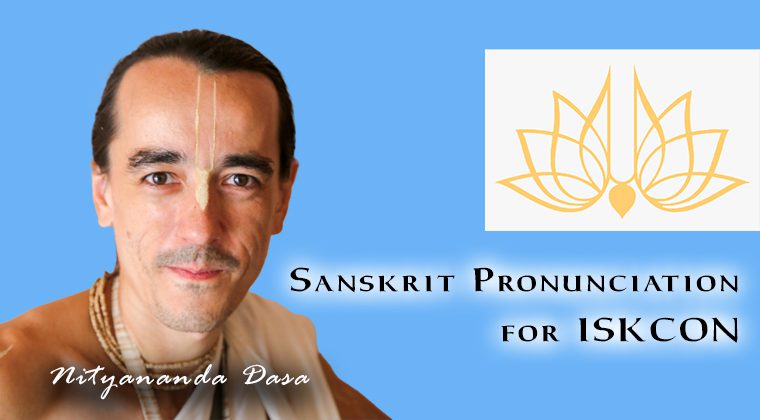Sanskrit Pronunciation for ISKCON – online course

by Nityananda Dasa
Hare Krishna dear devotees, please accept my humble obeisances. All glories to Srila Prabhupada.
ISKCON has become a huge worldwide movement that consists of people from every possible country and language background in the world. It is definitely easy to miss or even not find the correct Sanskrit pronunciation among its members, as every one of us brings pronunciation traits and accents from our native languages. Let alone this, many devotees end up creating their own conventions of how words in songs or mantras should sound, and these “conventions” are accepted as a standard for the next generation of devotees.
To briefly illustrate what I am talking about, we often hear ‘nāma om’ or ‘nāmas te [narasimhāya]’, with the first ‘a’ in ‘nama’ and ‘namas’ unnecessarily stretched. The correct way of pronouncing both the examples, even in singing, would be ‘nama oṁ…’ and ‘namas te…’ – keeping the initial syllable ‘na’ short. Also, we’ve heard things like ‘hey radhey vraja-deyvikey‘, where the vowel ‘e’ is wrongly changed to ‘ey.’
So, if you were ever curious about whether your pronunciation of the standard ISKCON Sanskrit prayers and songs is OK or not, there is good news for you. I, Nityānanda Dāsa, a student of H.G.Gopīparaṇadhana Prabhu, who has been working professionally in the field of Sanskrit for more than 15 years (as a BBT Sanskrit editor & online Sanskrit instructor), have come up with an online course, which I offers for free to all, and especially the devotees of ISKCON. The course is entitled “Sanskrit Pronunciation for ISKCON,” and it focuses on the correct way of pronouncing and even singing the standard prayers and verses that comprise the well-known book “Songs of the Vaiṣṇava ācāryas” by the BBT.
The course has two parts. The first part consists of demo videos, where I sing or chant through the prayers with a minimal music accompaniment, so that the attention of the listener is solely focused on the pronunciation. You will be encouraged to imbibe the proper Sanskrit sound just by listening to the demos regularly for a certain period of time. The second part of the course – tutorials – presents to you the detailed analysis of every verse, line, and even many words of every prayer. You will be introduced to the foundational principles of Sanskrit chanting and learn how to apply them right away, in your daily spiritual programs. Moreover, the course offers you a downloadable manual, with all the course notes and more in a PDF form, along with the mp3 playlist that you can use offline anywhere you go.
Overall, it is a unique, unprecedented program that fills a very important need of the ISKCON society, and I sincerely hope that devotees will take advantage of this great opportunity to learn and improve their Sanskrit pronunciation and chanting skills for their own, as well as the whole movement’s benefit.
Now, someone could come and say, “Come on! This is spiritual singing! Don’t burden us with these rules of Sanskrit. It is bhakti, from the heart, pronunciation is not that important!”
In response, I must say, “All right, prabhu, pronunciation is not that important, as you say, but let’s assume you’re a native English speaker, and someone who is very close to you sings on your birthday: “Huppy beerthday tow yow…” How would you feel? Yes, it is cute, especially if the person sang it with love, but it is also true that if you would point out to your friend that the words have to be pronounced in a certain way, he or she would surely listen to you and eagerly try to adopt the proper way of pronouncing the song – to make you even happier! It’s the same love, and it will find its way to express itself in all areas of reciprocation, including singing and chanting.”
So, we love Prabhupāda, previous ācāryas, Krishna and his incarnations, etc, and many songs written in their praise just happen to be in Sanskrit. Therefore, motivated by that same love, let’s try to make those songs sound in the way they were meant to, for the pleasure of whom they glorify. This would be the right, devotional mood with which we can approach this “Sanskrit Pronunciation for ISKCON” course. So, take it as your loving offering or as an austerity of speech, the results of which you offer to Krishna.
The last point to add is that there is an ancient tradition of spiritual singing in India. For example, in Śrī Vaiṣṇava sampradāya, Mādhva sampradāya, Vallabha sampradāya, and many other disciplic successions. The members of those spiritual lineages have many Sanskrit texts that they regularly chant and sing. Their pronunciation standards are very good and they maintain the main principles of Sanskrit pronunciation, starting from long and short vowels, even in singing. So I firmly believe that the existing ISKCON devotees certainly can and should learn, preserve, and even teach to the newcomers the correct Sanskrit pronunciation, chanting and singing the basic prayers that all devotees are supposed to know.
The course will be going live very soon – on October 15 (Vijaya Daśamī). You can already pre-enrol in and access it after the launch here: www.sanskritsense.com
The course, after the launch (on 15th October, 2021) will also be available here: www.iskconkirtanministry.com
your servant, Nityananda Dasa
